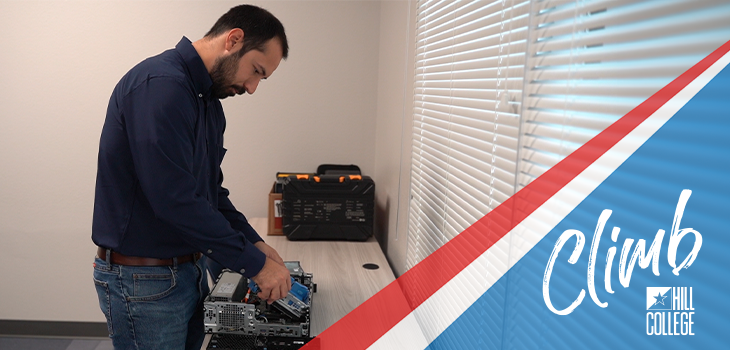
Program Summary
Information Technology is one of the fastest-growing industries in the nation. The Computer Science Program provides quality, in-depth training for individuals interested in software design, hardware, cybersecurity, media application, and general computer maintenance. Students are trained in industry-standard hardware and software through digital labs and in-person communication.
Get hands-on instruction in entry-level and advanced computer skills that will prepare you for a variety of computer-based professions.
Hill College is designated as a National Center of Academic Excellence in Cyber Defense Education for an Associate of Applied Science degree in computer science and networking cybersecurity. The curriculum path prepares students to complete nationally recognized industry certification exams such as Microsoft’s networking administration, CompTIA’s A+, Security+, and Network+.
Cybersecurity Center
Contact

Mohammed Al Tememi
Computer Science Program Coordinator
maltememi@hillcollege.edu
254.659.7869

Graduates of these programs will be able to:
- Communicate ideas and information effectively both orally and in writing for a range of audiences.
- Demonstrate analytical and critical-thinking skills with direct application to the computer science fields.
- Assemble the components of a PC and install one or more operating systems resulting in a functioning PC that is appropriate for a particular end user.
- Demonstrate technical and soft skills necessary to configure, maintain, implement, modify and troubleshoot network devices using appropriate network tools and understand the features and purpose of network technologies.
- Handle the day-to-day administration, security and design responsibilities for business networks of all sizes.
- Begin careers in a variety of entry-level positions in various fields involving computer network systems, such as computer network analyst, computer network technician, help desk analyst and WAN/LAN technician.
Computer Software & Media Applications
- Communicate ideas and information effectively orally, visually, and in writing for a range of audiences.
- Demonstrate analytical and critical-thinking skills with direct application to the digital media field.
- Adapt and update skills to emerging technologies and innovations as they become available.
- Utilize research, technical, and soft skills necessary to acquire, edit, manipulate, combine and integrate specific digital media technologies into a variety of output projects, devices, and presentations.
- Design and execute digital media projects for businesses of all types.
- Begin careers in a variety of entry-level positions in various fields involving digital media, such as designer, production artist, editor, pre- and post-production team member, art director, and trainer.
Computer Science in Networking Cybersecurity
- Communicate ideas and information effectively both orally and in writing for technical and non-technical audiences within the business environment.
- Apply analytical and critical-thinking skills with direct application to the field of computer systems and computer applications.
- Graduates will exemplify the skill sets needed to handle the day-to-day administration, security, and design responsibilities for business networks of various sizes.
- Graduates will exemplify the skill sets needed to utilize research, technical, and soft skills necessary to acquire, edit, manipulate, combine, and integrate specific digital media technologies into a variety of output projects, devices, and presentations.
- Graduates will exemplify the skill sets needed to create, modify, code, and test programs that use fundamental concepts.
Computer Programming
- Demonstrate written and oral competencies as they relate to employment and business communication.
- Describe roles embedded within teams and their values.
- Recognize the ethical implications involving current events and technologies.
- Construct, debug and execute programs using contemporary integrated software development environments.
- Understand programming methodologies, including object oriented, structured and procedural programming.
- Demonstrate the ability to create, modify, code, and test programs that use fundamental concepts.
